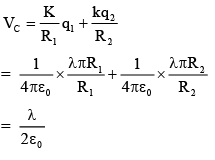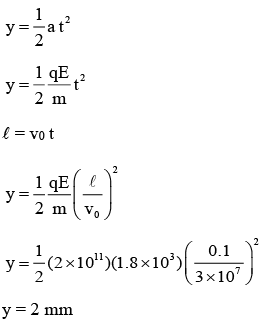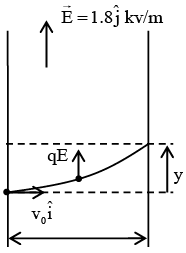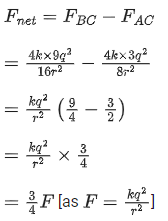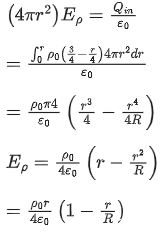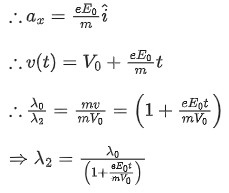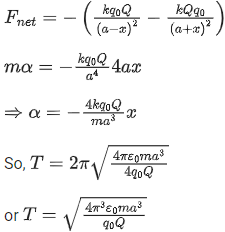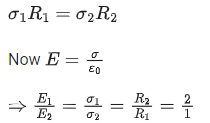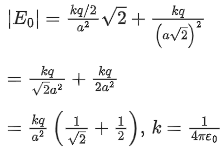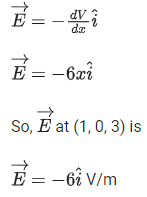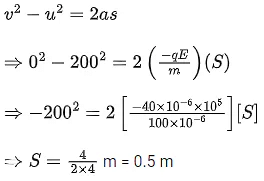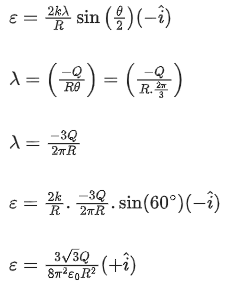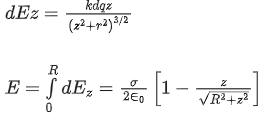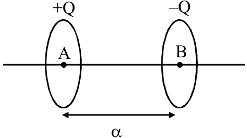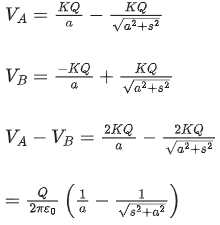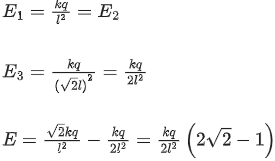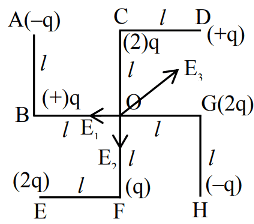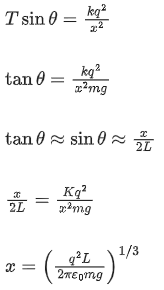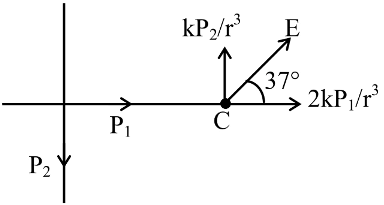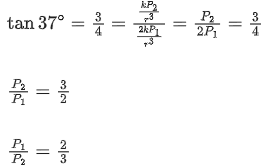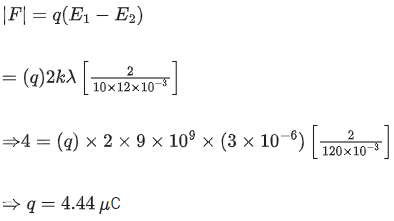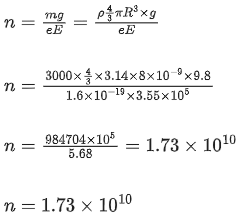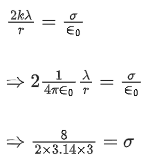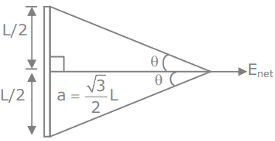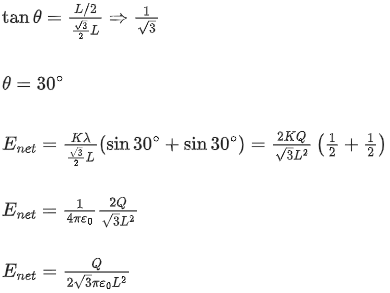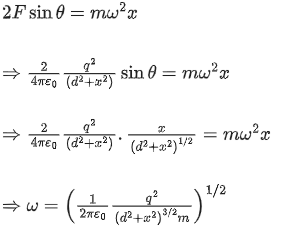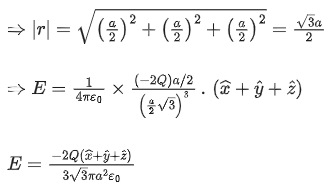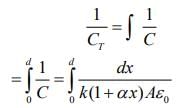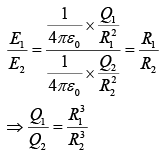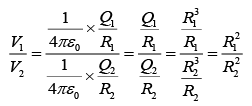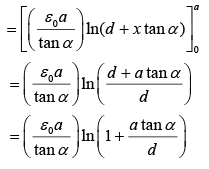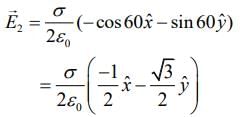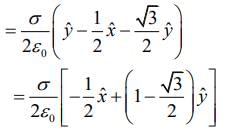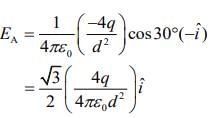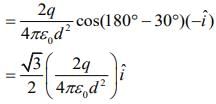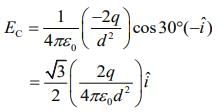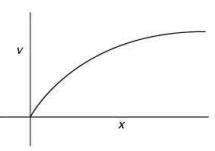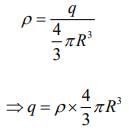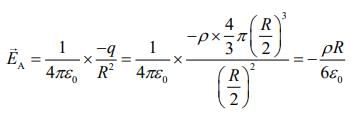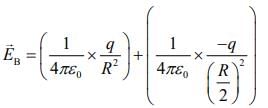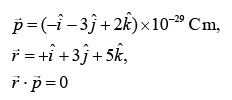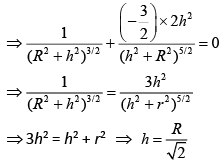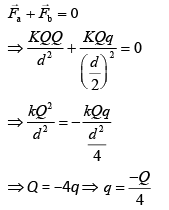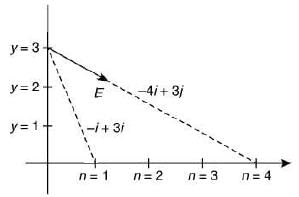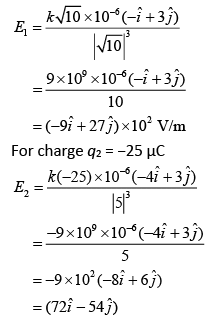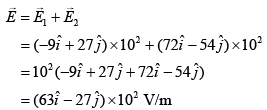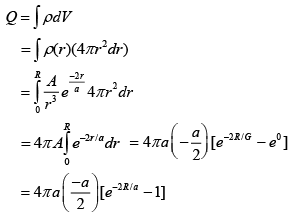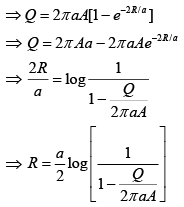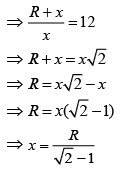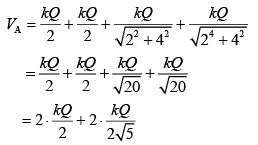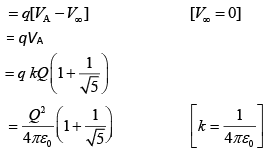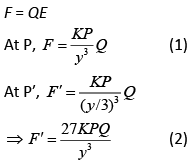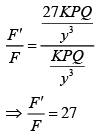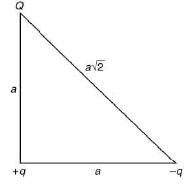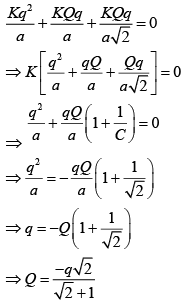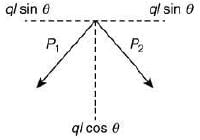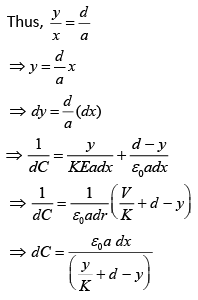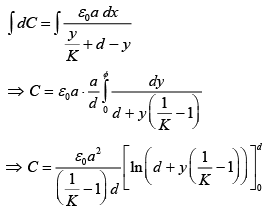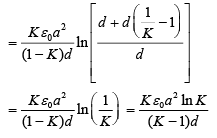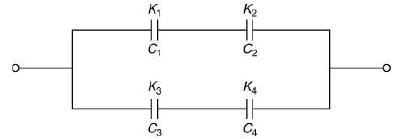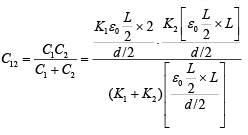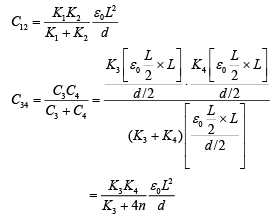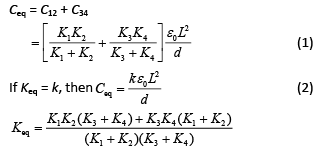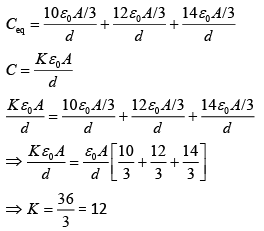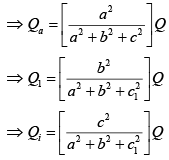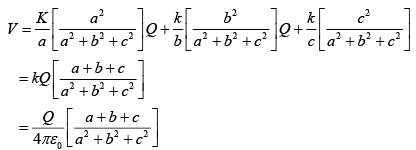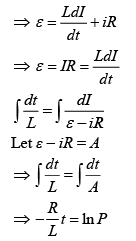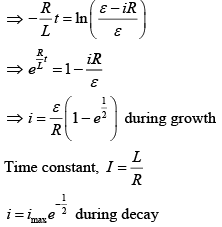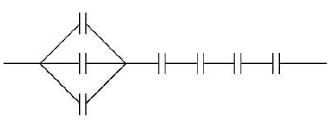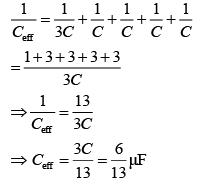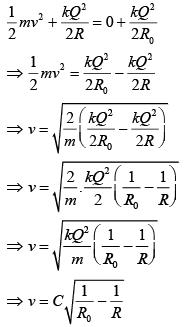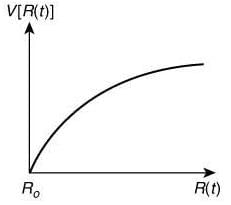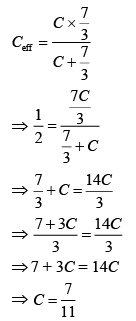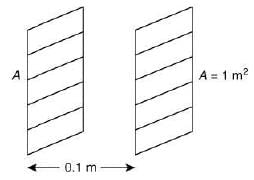Q.1. The electric potential at the centre of two concentric half rings of radii R1 and R2, having same linear charge density λ is : [JEE Main 2023]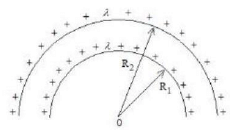 (a) λ/2ε0
(a) λ/2ε0
(b) λ/4ε0
(c) λ2/ε0
(d) λ/ε0
Ans. a
Q.2. If two charges q1 and q2 are separated with distance 'd' and placed in a medium of dielectric constant K. What will be the equivalent distance between charges in air for the same electrostatic force? [JEE Main 2023]
(a) 2d√k
(b) 1.5 d√k
(c) d√k
(d) k√d
Ans. (c)
For same force
Q.3. A stream of a positively charged particles having  and velocity
and velocity  is deflected by an electric field
is deflected by an electric field  . The electric field exists in a region of 10 cm along x direction. Due to the electric field, the deflection of the charge particles in the y direction is _____ mm [JEE Main 2023]
. The electric field exists in a region of 10 cm along x direction. Due to the electric field, the deflection of the charge particles in the y direction is _____ mm [JEE Main 2023]
Ans. 2
Q.4. A parallel plate capacitor with air between the plate has a capacitance of 15pF. The separation between the plate becomes twice and the space between them is filled with a medium of dielectric constant 3.5. Then the capacitance becomes  The value of x is _________ [JEE Main 2023]
The value of x is _________ [JEE Main 2023]
Ans. 105
Q.5. Two identical metallic spheres A and B when placed at certain distance in air repel each other with a force of F. Another identical uncharged sphere C is first placed in contact with A and then in contact with B and finally placed at midpoint between spheres A and B. The force experienced by sphere C will be: [JEE Main 2022]
(a) 3F/2
(b) 3F/4
(c) F
(d) 2F
Ans. (b)
Let two identical spheres have charge q. And distance between them = r
∴ Force between the spheres (F) = kq2 / r2
Now when an identical uncharged sphere C comes in contact with A, charge q on sphere A get's divided equally to both sphere.
So, both sphere A and C have charge = q2
Now, C get's in contact with B. So their total charge (q + q / 2) gets divided equally.
So, charge on both B and C is =Now, C is place midpoint between A and B.
Repulsion force between A and C,
Repulsion force between B and C,FBC=k(3q4)(3q4)(r2)2=4k×9q216r2
∴ Net force on C,
Q.6. Given below are two statements. [JEE Main 2022]
Statement I : Electric potential is constant within and at the surface of each conductor.
Statement II : Electric field just outside a charged conductor is perpendicular to the surface of the conductor at every point.
In the light of the above statements, choose the most appropriate answer from the options given below.
(a) Both Statement I and Statement II are correct
(b) Both Statement I and Statement II are incorrect
(c) Statement I is correct but Statement II is incorrect
(d) Statement I is incorrect but Statement II is correct
Ans. (a)
Sincein the bulk of a conductor
⇒ Potential would be constant.
⇒ Statement I is correct
Since a conductor's surface is equipotential,just outside is perpendicular to the surface.
Q.7. A spherically symmetric charge distribution is considered with charge density varying as Where, r(r<R) is the distance from the centre O (as shown in figure). The electric field at point P will be: [JEE Main 2022]
Where, r(r<R) is the distance from the centre O (as shown in figure). The electric field at point P will be: [JEE Main 2022]
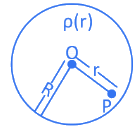 (a)
(a) 
(b) 
(c) 
(d) 
Ans. (c)
Q.8. A uniform electric field E=(8 m/e)V/m is created between two parallel plates of length
1 m as shown in figure, (where m= mass of electron and e = charge of electron). An electron enters the field symmetrically between the plates with a speed of 2 m/s. The angle of the deviation (θ) of the path of the electron as it comes out of the field will be _________. [JEE Main 2022]
(a) tan−1 (4)
(b) tan−1 (2)
(c) tan−1 (1/3)
(d) tan−1 (3)
Ans. (b)
E = 8m/e V/m
l = 1 m
vx = 2 m/s
ay = −8 m/s2
t = l / vx = 1 / 2s
⇒ |vy| = 4 m/s
⇒ angle of deviation = θ
Q.9. A charge of 4μC is to be divided into two. The distance between the two divided charges is constant. The magnitude of the divided charges so that the force between them is maximum, will be : [JEE Main 2022]
(a) 1μC and 3μC
(b) 2μC and 2μC
(c) 0 and 4μC
(d) 1.5μC and 2.5μC
Ans. (b)
So,
so Fmax will be at q = 2 μC
Q.10. An electron (mass m) with an initial velocity  is moving in an electric field
is moving in an electric field  where E0 is constant. If at t = 0 de Broglie wavelength is λ0 = h / mv0, then its de Broglie wavelength after time t is given by [JEE Main 2022]
where E0 is constant. If at t = 0 de Broglie wavelength is λ0 = h / mv0, then its de Broglie wavelength after time t is given by [JEE Main 2022]
(a) λ0
(b) 
(c) λ0t
(d) 
Ans. (d)
Q.11. Two identical positive charges Q each are fixed at a distance of '2a' apart from each other. Another point charge q0 with mass 'm' is placed at midpoint between two fixed charges. For a small displacement along the line joining the fixed charges, the charge q0 executes SHM. The time period of oscillation of charge q0 will be : [JEE Main 2022]
(a) 
(b)
(c) 
(d) 
Ans. (a)
(x << a) (α is acceleration)
Q.12. Two uniformly charged spherical conductors A and B of radii 5 mm and 10 mm are separated by a distance of 2 cm. If the spheres are connected by a conducting wire, then in equilibrium condition, the ratio of the magnitudes of the electric fields at the surface of the sphere A and B will be : [JEE Main 2022]
(a) 1 : 2
(b) 2 : 1
(c) 1 : 1
(d) 1 : 4
Ans. (b)
After connection
Q.13. A vertical electric field of magnitude 4.9 × 105 N/C just prevents a water droplet of a mass 0.1 g from falling. The value of charge on the droplet will be : (Given : g = 9.8 m/s2) [JEE Main 2022]
(a) 1.6 × 10−9 C
(b) 2.0 × 10−9 C
(c) 3.2 × 10−9 C
(d) 0.5 × 10−9 C
Ans. (b)
Since the droplet is at rest
⇒ Net force = 0
⇒ mg = qE
⇒ q = mg / E = 2 × 10−9 C
Q.14. A long cylindrical volume contains a uniformly distributed charge of density ρ. The radius of cylindrical volume is R. A charge particle (q) revolves around the cylinder in a circular path. The kinetic energy of the particle is : [JEE Main 2022]
(a) 
(b) 
(c) 
(d) 
Ans. (a)
Q.15. Two identical charged particles each having a mass 10 g and charge 2.0 × 10−7C are placed on a horizontal table with a separation of L between them such that they stay in limited equilibrium. If the coefficient of friction between each particle and the table is 0.25, find the value of L. [Use g = 10 ms−2] [JEE Main 2022]
(a) 12 cm
(b) 10 cm
(c) 8 cm
(d) 5 cm
Ans. (a)
According to given information:
Putting the values, we get
L = 12 cm
Q.16. Sixty four conducting drops each of radius 0.02 m and each carrying a charge of 5 μC are combined to form a bigger drop. The ratio of surface density of bigger drop to the smaller drop will be : [JEE Main 2022]
(a) 1 : 4
(b) 4 : 1
(c) 1 : 8
(d) 8 : 1
Ans. (b)
q' = 64q ...... (i)
A' = 16 A ..... (ii)
Dividing (i) & (ii),
σ' = 4σ
⇒ σ' / σ = 4/1
Q.17. Given below two statements : One is labelled as Assertion (A) and other is labelled as Reason (R). [JEE Main 2022]
Assertion (A) : Non-polar materials do not have any permanent dipole moment.
Reason (R) : When a non-polar material is placed in an electric field, the centre of the positive charge distribution of it's individual atom or molecule coincides with the centre of the negative charge distribution.
In the light of above statements, choose the most appropriate answer from the options given below.
(a) Both (A) and (R) are correct and (R) is the correct explanation of (A).
(b) Both (A) and (R) are correct and (R) is not the correct explanation of (A).
(c) (A) is correct but (R) is not correct.
(d) (A) is not correct but (R) is correct.
Ans. (c)
Non-polar bonds do not have any net dipole moment and are generally formed in compound where there is presence of symmetry.
When non polar material placed in electric field, due to redistribution of charges dipole is formed.
So, (R) is incorrect.
Q.18. Three identical charged balls each of charge 2 C are suspended from a common point P by silk threads of 2 m each (as shown in figure). They form an equilateral triangle of side 1m. The ratio of net force on a charged ball to the force between any two charged balls will be : [JEE Main 2022]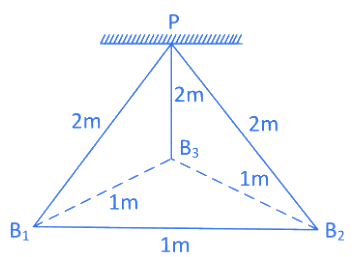 (a) 1 : 1
(a) 1 : 1
(b) 1 : 4
(c) √3 : 2
(d) √3 : 1
Ans. (d)
Fnet on charge 3, F1 =
Force between any 2 charges
Q.19. If a charge q is placed at the centre of a closed hemispherical non-conducting surface, the total flux passing through the flat surface would be : [JEE Main 2022]
(a) q / ∈0
(b) q / 2∈0
(c) q / 4∈0
(d) q / 2π∈0
Ans. (b)
Flux passing through flat surface = Flux passing through curved surface.
So, Ф = q / 2∈0
Q.20. The three charges q/2, q and q/2 are placed at the corners A, B and C of a square of side 'a' as shown in figure. The magnitude of electric field (E) at the corner D of the square, is : [JEE Main 2022]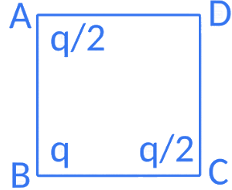 (a)
(a) 
(b) 
(c) 
(d) 
Ans. (a)
Q.21. Given below are two statements : [JEE Main 2022]
Statement I : A point charge is brought in an electric field. The value of electric field at a point near to the charge may increase if the charge is positive.
Statement II : An electric dipole is placed in a non-uniform electric field. The net electric force on the dipole will not be zero.
Choose the correct answer from the options given below :
(a) Both Statement I and Statement II are true.
(b) Both Statement I and Statement II are false.
(c) Statement I is true but Statement II is false.
(d) Statement I is false but Statement II is true.
Ans. (a)
As one moves closer to a positive charge (isolated) the density of electric field line increases and so does the electric field intensity
⇒ Statement I is true
As opposite poles of an electric dipole would experience equal and opposite forces so net force on a dipole in a uniform electric field will be zero
⇒ Statement II is true
Q.22. Two point charges A and B of magnitude +8 × 10−6 C and −8 × 10−6 C respectively are placed at a distance d apart. The electric field at the middle point O between the charges is 6.4 × 104 NC−1. The distance 'd' between the point charges A and B is : [JEE Main 2022]
2.0 m
3.0 m
1.0 m
4.0 m
Ans. (b)
Electric field at P will be
So,
So, d = 3 m
Q.23. If the electric potential at any point (x, y, z) m in space is given by V = 3x2 volt. The electric field at the point (1, 0, 3) m will be : [JEE Main 2022]
(a) 3 Vm−1, directed along positive x-axis.
(b) 3 Vm−1, directed along negative x-axis.
(c) 6 Vm−1, directed along positive x-axis.
(d) 6 Vm−1, directed along negative x-axis.
Ans. (d)
Q.24. Two point charges Q each are placed at a distance d apart. A third point charge q is placed at a distance x from mid-point on the perpendicular bisector. The value of x at which charge q will experience the maximum Coulomb's force is : [JEE Main 2022]
(a) x = d
(b) x = d2
(c) x = d√2
(d) x= d / 2√2
Ans. (d)
Force experienced by the charge q
For maximum Coulomb's force for x
dF / dx = 0
On Solving
Q.25. A positive charge particle of 100 mg is thrown in opposite direction to a uniform electric field of strength 1 × 105 NC−1. If the charge on the particle is 40 μC and the initial velocity is 200 ms−1, how much distance it will travel before coming to the rest momentarily : [JEE Main 2022]
(a) 1 m
(b) 5 m
(c) 10 m
(d) 0.5 m
Ans. (d)
Q.26. A disk of radius R with uniform positive charge density σ is placed on the xy plane with its center at the origin. The Coulomb potential along the z-axis is [JEE Advance 2022] A particle of positive charge q is placed initially at rest at a point on the z axis with z = z0 and z0 > 0. In addition to the Coulomb force, the particle experiences a vertical force
A particle of positive charge q is placed initially at rest at a point on the z axis with z = z0 and z0 > 0. In addition to the Coulomb force, the particle experiences a vertical force  with c > 0. Let β =
with c > 0. Let β =  .
.
Which of the following statement(s) is(are) correct? (More than One Correct Answer)
(a) For β = 1/4 and z0 = 25/7R, the particle reaches the origin.
(b) For β = 1/4 and z0 = 3/7R, the particle reaches the origin.
(c) For β = 1/4 and z0 = R/√3, the particle returns back to z = z0.
(d) For β > 1 and z0 > 0, the particle always reaches the origin.
Ans. (a, c, d)
Q.27. In the figure, the inner (shaded) region A represents a sphere of radius rA = 1, within which the electrostatic charge density varies with the radial distance r from the center as ρA = kr, where k is positive. In the spherical shell B of outer radius rB, the electrostatic charge density varies as ρB = 2k / r. Assume that dimensions are taken care of. All physical quantities are in their SI units. [JEE Advance 2022]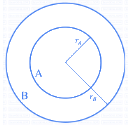 Which of the following statement(s) is(are) correct?
Which of the following statement(s) is(are) correct?
(a) If rB = √3/2, then the electric field is zero everywhere outside B.
(b) If rB = 3/2, then the electric potential just outside B is k / ϵ0.
(c) If rB = 2, then the total charge of the configuration is 15πk.
(d) If rB = 5/2, then the magnitude of the electric field just outside B is 13πk / ϵ0.
Ans. (b)
Q.28. Six charges are placed around a regular hexagon of side length a as shown in the figure. Five of them have charge q, and the remaining one has charge x. The perpendicular from each charge to the nearest hexagon side passes through the center 0 of the hexagon and is bisected by the side. [JEE Advance 2022]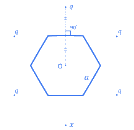 Which of the following statement(s) is(are) correct in SI units?
Which of the following statement(s) is(are) correct in SI units?
(a) When x = q, the magnitude of the electric field at 0 is zero.
(b) When x = −q, the magnitude of the electric field at 0 is q / 6πϵoa2.
(c) When x = 2q, the potential at 0 is 7q / 4√3πϵoa.
(d) When x = −3q, the potential at 0 is −3q / 4√3πϵoa.
Ans. (a, b, c)
Q.29. A cube is placed inside an electric field,  . The side of the cube is 0.5 m and is placed in the field as shown in the given figure. The charge inside the cube is : [JEE Main 2021]
. The side of the cube is 0.5 m and is placed in the field as shown in the given figure. The charge inside the cube is : [JEE Main 2021]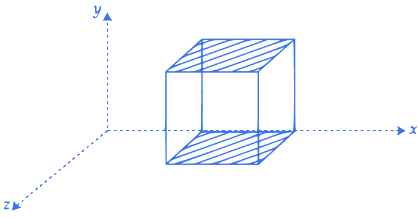 (a) 3.8 × 10−11 C
(a) 3.8 × 10−11 C
(b) 8.3 × 10−11 C
(c) 3.8 × 10−12 C
(d) 8.3 × 10−12 C
Ans. (b)
Given, the side of the cube, s = 0.5 m
Electric field, E = 150 y2j^
The direction of electric field is as shown in the below figure,At bottom surface, y = 0
As we know that, the expression of electric flux,
ϕ = E . A cosθ
Here, E is the electric field passing through the cube and A is the surface area of the cube.
Substituting the values in the above equations, we get
ϕ = 150y2 . (0.5 × 0.5) × cos180∘
= 150(0)2 . (0.25) × (−1) = 0
Hence, the electric flux is zero at the bottom surface.
At the top surface, y = 0.5 m
Electric field, E = 150 y2j^ = 150(0.5)2 = 37.5 N/C
Electric flux at the top surface,
ϕ = E . A cosθ
= (37.5) . (0.5 × 0.5) cos0∘
= 9.375 N / C - m2
By using the Gauss's law, ϕ = Qin / ε0
Here, Qin = net charge enclosed in the cube and ε0 = permittivity of the free space.
Substituting the values in the above equation, we get
9.375 = Qin / 8.85×10−12
Qin = 8.3 × 10-11 C
The charge inside the cube is 8.3 × 10-11 C.
Q.30. Choose the incorrect statement : [JEE Main 2021]
(1) The electric lines of force entering into a Gaussian surface provide negative flux.
(2) A charge 'q' is placed at the centre of a cube. The flux through all the faces will be the same.
(3) In a uniform electric field net flux through a closed Gaussian surface containing no net charge, is zero.
(4) When electric field is parallel to a Gaussian surface, it provides a finite non-zero flux.
Choose the most appropriate answer from the options given below
(a) (3) and (4) only
(b) (2) and (4) only
(c) (4) only
(d) (1) and (3) only
Ans. (c)
Since,θ = 90∘
∴ ϕ = 0
Q.31. Two particles A and B having charges 20μC and −5μC respectively are held fixed with a separation of 5 cm. At what position a third charged particle should be placed so that it does not experience a net electric force? [JEE Main 2021] (a) At 5 cm from 20 μC on the left side of system
(a) At 5 cm from 20 μC on the left side of system
(b) At 5 cm from −5 μC on the right side
(c) At 1.25 cm from −5 μC between two charges
(d) At midpoint between two charges
Ans. (b)
Null point is possible only right side of −5 μC
x = 5 cm
∴ Option (b) is correct.
Q.32. Figure shows a rod AB, which is bent in a 120∘ circular arc of radius R. A charge (−Q) is uniformly distributed over rod AB. What is the electric field  at the centre of curvature O ? [JEE Main 2021]
at the centre of curvature O ? [JEE Main 2021]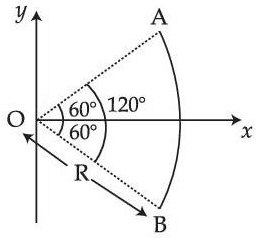 (a)
(a) 
(b) 
(c) 
(d) 
Ans. (b)
Q.33. A uniformly charged disc of radius R having surface charge density σ is placed in the xy plane with its center at the origin. Find the electric field intensity along the z-axis at a distance Z from origin :- [JEE Main 2021]
(a) 
(b) 
(c) 
(d) 
Ans. (a)
Consider a small ring of radius r and thickness dr on disc.area of elemental ring on disc
dA = 2πrdr
charge on this ring dq = σdA
Q.34. The two thin coaxial rings, each of radius 'a' and having charges +Q and −Q respectively are separated by a distance of 's'. The potential difference between the centres of the two rings is : [JEE Main 2021]
(a) 
(b) 
(c) 
(d) 
Ans. (d)
Q.35. A solid metal sphere of radius R having charge q is enclosed inside the concentric spherical shell of inner radius a and outer radius b as shown in the figure. The approximate variation electric field as a function of distance r from centre O is given by [JEE Main 2021]
as a function of distance r from centre O is given by [JEE Main 2021]
(a)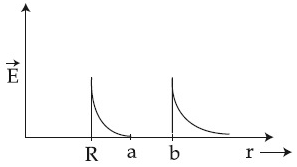
(b)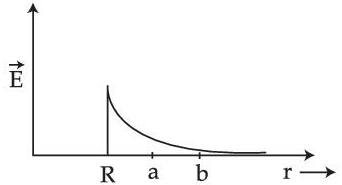
(c)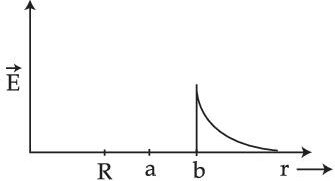
(d)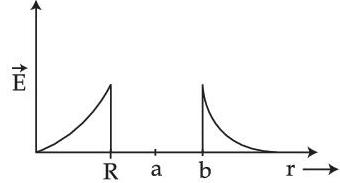
Ans. (a)
Considering outer spherical shell is non-conducting.
Electric field inside a metal sphere is zero.
r < R ⇒ E = 0
r > R ⇒ E = KQ/r2Option (b)
Considering outer spherical shell is conductingr < R, E = 0
R ≤ r < a
E = kQ / r2
a≤ r < b,
E = 0
r ≥ b,
E = kQ / r2
Q.36. What will be the magnitude of electric field at point O as shown in the figure? Each side of the figure is l and perpendicular to each other? [JEE Main 2021]
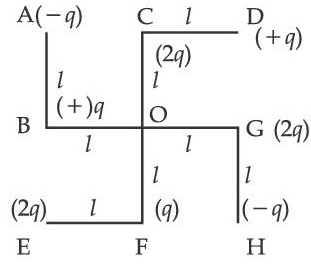 (a)
(a) 
(b) 
(c) 
(d) 
Ans. (b)
Q.37. Two identical tennis balls each having mass 'm' and charge 'q' are suspended from a fixed point by threads of length 'l'. What is the equilibrium separation when each thread makes a small angle 'θ' with the vertical? [JEE Main 2021]
(a) 
(b) 
(c) 
(d) 
Ans. (b)
Tcosθ = mg
Q.38. Two ideal electric dipoles A and B, having their dipole moment p1 and p2 respectively are placed on a plane with their centres at O as shown in the figure. At point C on the axis of dipole A, the resultant electric field is making an angle of 37∘ with the axis. The ratio of the dipole moment of A and B, p1 / p2 is : (take sin37∘ = 3/5) [JEE Main 2021]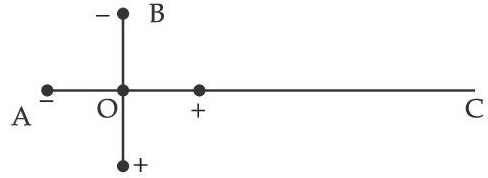 (a) 3/8
(a) 3/8
(b) 3/2
(c) 2/3
(d) 4/3
Ans. (c)
Q.39. An electric dipole is placed on x-axis in proximity to a line charge of linear charge density 3.0 × 10−6 C/m. Line charge is placed on z-axis and positive and negative charge of dipole is at a distance of 10 mm and 12 mm from the origin respectively. If total force of 4N is exerted on the dipole, find out the amount of positive or negative charge of the dipole.
[JEE Main 2021]
(a) 0.485 mC
(b) 815.1 nC
(c) 8.8 μC
(d) 4.44 μC
Ans. (d)
Q.40. A certain charge Q is divided into two parts q and (Q − q). How should the charges Q and q be divided so that q and (Q − q) placed at a certain distance apart experience maximum electrostatic repulsion? [JEE Main 2021]
(a) Q = 2q
(b) Q = 4q
(c) Q = 3q
(d) Q = q / 2
Ans. (a)
Let's say the charge q and (Q − q) are at r distance from each other. This can be shown asAccording to Coulomb's law, force between both the parts can be given as
As we know that dF / dq = 0, for maximum force.
Q.41. A current of 5 A is passing through a non-linear magnesium wire of cross-section 0.04 m2. At every point the direction of current density is at an angle of 60∘ with the unit vector of area of cross-section. The magnitude of electric field at every point of the conductor is :
(Resistivity of magnesium ρ = 44 × 10−8 Ωm) [JEE Main 2021]
(a) 11 × 10−5 V/m
(b) 11 × 10−3 V/m
(c) 11 × 10−7 V/m
(d) 11 × 10−2 V/m
Ans. (a)
Given, current, I = 5A
Area of cross-section of wire, A = 0.04 m2
We know that, J = I / A
⇒ I = JA
or I = J.A or I = JAcosθ
where, J = current density.
⇒ J = 250 Am−2
The relation between electric field, current density and resistivity can be given as,
E = ρ . J
= 44 × 10−8 × 250 [∵ Resistivity, ρ = 44 × 10−8 Ω-m]
= 11 × 10−5 V/m
Q.42. An oil drop of radius 2 mm with a density 3g cm−3 is held stationary under a constant electric field 3.55 × 105 V m−1 in the Millikan's oil drop experiment. What is the number of excess electrons that the oil drop will possess? (consider g = 9.81 m/s2) [JEE Main 2021]
(a) 48.8 × 1011
(b) 1.73 × 1010
(c) 17.3 × 1010
(d) 1.73 × 1012
Ans. (b)
Fe = qE = (ne)E
Fe = mg
(ne)E = mg
Q.43. Find out the surface charge density at the intersection of point x = 3 m plane and x-axis, in the region of uniform line charge of 8 nC/m lying along the z-axis in free space.
[JEE Main 2021]
(a) 0.424 nC m−2
(b) 4.0 nC m−2
(c) 47.88 C/m
(d) 0.07 nC m−2
Ans. (a)
Electric field due to wire is given by E=2kλ / r
Electric field with surface charge density E = σ / ∈0
⇒ σ = 0.424 n Cm−2
Q.44. An inclined plane making an angle of 30∘ with the horizontal is placed in a uniform horizontal electric field 200N / C as shown in the figure. A body of mass 1 kg and charge 5 mC is allowed to slide down from rest at a height of 1 m. If the coefficient of friction is 0.2, find the time taken by the body to reach the bottom. [JEE Main 2021]
[g = 9.8 m/s2; sin30∘ = 1/2; cos30∘ = √3/2]
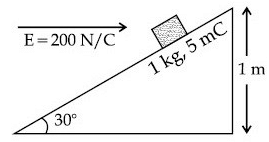 (a) 0.46 s
(a) 0.46 s
(b) 0.92 s
(c) 1.3 s
(d) 2.3 s
Ans. (c)
f = mg sinθ − (μN + qE cosθ)
F = mg sinθ − μ(mg cosθ + qE sinθ) − qE cosθ
F = 1 × 10 × sin3
− 0.2 (1 × 10 × cos30∘ + 200 × 5 × 10−3 sin30∘
− 200 × 5 × 10−3 cos30∘
⇒ F = 2.3 N
a = F / m = 2.31= 2.3 m/sec2
Q.45. Given below are two statements: [JEE Main 2021]
Statement I : An electric dipole is placed at the center of a hollow sphere. The flux of the electric field through the sphere is zero but the electric field is not zero anywhere in the sphere.
Statement II : If R is the radius of a solid metallic sphere and Q be the total charge on it. The electric field at any point on the spherical surface of radius r (< R) is zero but the electric flux passing through this closed spherical surface of radius r is not zero..
In the light of the above statements, choose the correct answer from the options given below:
(a) Both Statement I and Statement II are true
(b) Statement I is false but Statement II is true
(c) Statement I is true but Statement II is false
(d) Both Statement I and Statement II are false
Ans. (c)
Net charge on electric dipole = + q − q = 0
Hence, according to Gauss's law,
Electric flux, ϕ = qnet / ε0 = 0 / ε0 = 0
Electric field due to electric dipole is non-zero and varies at point to point.
Hence, statement I is true.
Electric field due to charged solid sphere at a distance r from centre.
E = 1 / 4πε0.Qr / R3 [when r < R, R → radius] which is non-zero
Hence, statement II is false.
Hence, option (c) is the correct.
Q.46. Find the electric field at point P (as shown in figure) on the perpendicular bisector of a uniformly charged thin wire of length L carrying a charge Q. The distance of the point P from the centre of the rod is a = √3/2L. [JEE Main 2021]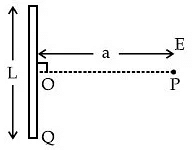 (a)
(a) 
(b) 
(c) 
(d) 
Ans. (c)
Q.47. A charge 'q' is placed at one corner of a cube as shown in figure. The flux of electrostatic field  through the shaded area is : [JEE Main 2021]
through the shaded area is : [JEE Main 2021]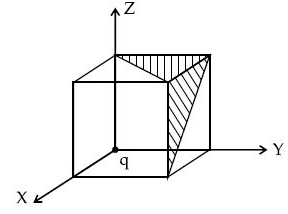 (a)
(a) 
(b) 
(c) 
(d) 
Ans. (a)
Flux through cube, ϕ = q / 8ε0
Flux through surfaces ABEH, ADGH, ABCD will be zero.
ϕ(EFGH) = ϕ(DCFG) = ϕ(EBCF) = 1 / 3(q / 8ε0)
=
Q. 48. Two electrons each are fixed at a distance '2d'. A third charge proton placed at the midpoint is displaced slightly by a distance x (x << d) perpendicular to the line joining the two fixed charges. Proton will execute simple harmonic motion having angular frequency : (m = mass of charged particle) [JEE Main 2021]
(a) 
(b) 
(c) 
(d) 
Ans. (b)
The arrangement of charges is shown belowAs we know that,
Coulomb's force between two charges. i.e., q1 and q2,
Here, q1= q2 = q
Force in SHM, F = mω2x ...... (ii)
Since, in order to have SHM +q should move downwards and force responsible for this will be only
F′ = Fsinθ + Fsinθ = 2Fsinθ ..... (iii)
Using Eqs. (ii) and (iii), we get
As, x<<d
Q.49. A cube of side 'a' has point charges +Q located at each of its vertices except at the origin where the charge is −Q. The electric field at the centre of cube is : [JEE Main 2021]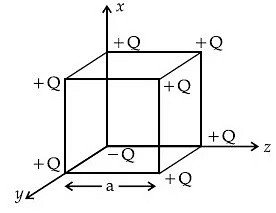 (a)
(a) 
(b) 
(c) 
(d) 
Ans. (d)
We can replace − Q charge at origin by + Q and − 2Q. Now, due to + Q charge at every corner of cube, electric field at centre of cube is zero. So, net electric field at centre is only due to − 2Q charge at origin. Vector form of electric field strength,
Here, position vector,
Q.50. A parallel plate capacitor has plates of area A separated by distance d between them. It is filled with a dielectric which has a dielectric constant that varies as k(x) = K(1+αx ) where x is the distance measured from one of the plates. If (αd ) << 1, the total capacitance of the system is best given by the expression [2020]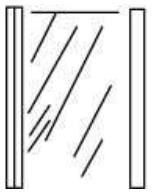




Ans: (1)
Given that, parallel plate capacitor filled with dielectric constant k(x) which varies as, k(x) = K(1+αx)
where x is distance measured from one of the plates.
Now, capacitance of a small element dx is given by
So, total capacitance is given by
For αd << 1 , we have
Now, using binomial expansion, we get
Q.51. A 60 pF capacitor is fully charged by a 20 V supply. It is then disconnected from the supply and is connected to another uncharged 60 pF capacitor in parallel. The electrostatic energy that is lost in this process by the time and charge is redistributed between them is (in nJ) _________. [2020]
Ans: (6)
Given that, C = 60 pF = 60 × 10−12 F and V = 20 V.
We know that, energy when capacitor is fully charged is given by
Energy when capacitor is disconnected and connected to uncharged capacitor is
Where C' = C+C = 2C and V' = V/2
Then,
So, energy lost is
Q.52. Effective capacitance of parallel combination two capacitors C1 and C2 is 10 μF. When these capacitors are individually connected to a voltage source of 1 V, the energy stored in the capacitor C2 is 4 times that of C1. If these capacitors are connected in series, their effective capacitance will be [2020]
(a) 4.2 μF
(b) 3.2 μF
(c) 1.6 μF
(d) 8.4 μF
Ans: (c)
Given that
CP = C1 + C2 = 10μF ...(1)
Energy stored in capacitor is given by
We know that
⇒C2 = 4C1 (since V = 1V) ...(2)
Solving Eqs. (1) and (2), we get
C1 = 2μF, C2 = 8μF
Effective capacitance of series combination is
Q.53. Consider two charged metallic spheres S1 and S2 of radii R1 and R2 respectively. The electric fields E1 (on S1) and E2 (on S2) on their surface are such that E1/E2 = R1/R2. Then the ratio V1 ( on S1) /V2 ( on S2) of the electrostatic potentials on each sphere is [2020]
(a) R1/ R2
(b) (R1/ R2)2
(c) R2/ R1
(d) (R1/ R2)3
Ans: (b)
Given that
We know that, electric filed is given by
So,
We know that, electrostatic potential is given by
So,
Q.54. A capacitor is made of two square plates each of side α making a very small angle α between them, as shown in figure. The capacitance will be close to [2020]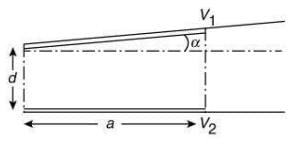

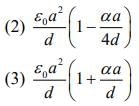

Ans: (1)
Let small element dx at distance x has capacitance dC.We know that, capacitance of parallel plat capacitor is given by
So,
Since α is very small so tan α ≈ α .
Therefore,
Q.55. Two identical capacitors A and B, charged to the same potential 5 V are connected in two different circuits as shown below at time t = 0. If the charge on capacitors A and B at time t = CR is QA and QB respectively, then (Here e is the base of natural logarithm) [2020]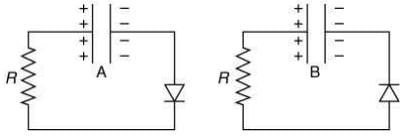 (a) QA = VC/e, QB = CV/2
(a) QA = VC/e, QB = CV/2
(b) QA = VC, QB = CV
(c) QA = VC, QB =VC/e
(d) QA = CV/2, QB = VC/e
Ans: (c)
In first circuit diode is reversed biased so it is open circuit.
so, QA = CV
In second circuit diode is forward biased so it it short circuit.
So, current flow in the circuit at time t is given by
At t = RC, we get
Q.56. Two infinite planes each with uniform surface charge density +σ are kept in such a way that the angle between them is 30º. The electric field in the region shown between them is given by [2020]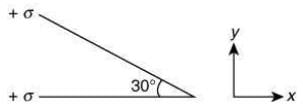
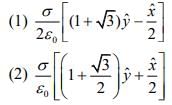
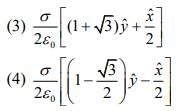
Ans: (4)
Given that
Electric filed due to infinite plane is given by
For first infinite plane, electric filed is given by
For second infinite plane, electric filed is given by
So, resultant electric field in region is
Q.57. Three charged particles A, B and C with charges −4q, 2q and −2q are present on the circumference of a circle of radius d. The charged particles A, C and Centre O of the circle formed an equilateral triangle as shown in figure. Electric field at O along x-direction is [2020]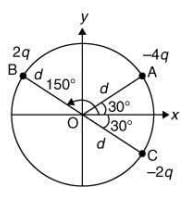

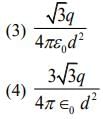
Ans: (1)
Given that,
QA = -4q, QB = 2q, QC = -2q
x component of electric field due to point charge A at centre O is given by
x component of electric field due to point charge B at centre O is given by
x component of electric field due to point charge C at centre O is given by
Total x component electric field due to point charges A, B, and C at centre O is given by
ET = EA + EB + EC
Q.58. In finding the electric field using Gauss law the formula  is applicable. In the formula ε0 is permittivity of free space, A is the area of Gaussian surface and qenc is charge enclosed by the Gaussian surface. This equation can be used in which of the following situation?
is applicable. In the formula ε0 is permittivity of free space, A is the area of Gaussian surface and qenc is charge enclosed by the Gaussian surface. This equation can be used in which of the following situation?
(a) Only when the Gaussian surface is an equipotential surface.
(b) Only when the Gaussian surface is an equipotential surface and  is constant on the surface.
is constant on the surface.
(c) Only when  = constant on the surface.
= constant on the surface.
(d) For any choice of Gaussian surface. [2020]
Ans. (b)
Gauss law is given by
Gauss law only holds when gaussian surface is an equipotential surface and electric field is constant throughout the surface.
Q.59. A particle of mass m and charge q is released from rest in a uniform electric field. If there is no other force on the particle, the dependence of its speed v on the distance x travelled by it is correctly given by (graphs are schematic and not drawn to scale).
(a)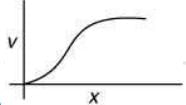
(b)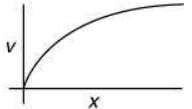
(c)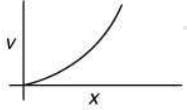
(d)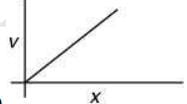
Ans. (b)
Given that vi = 0
Coulomb force is given by F = qE
⇒ ma = qE
⇒ a = qE/m
Final velocity of charge particle in electric filed is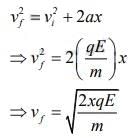
Only option (2) graph satisfy the condition.
Q.60. Consider a sphere of radius R which carries a uniform charge density ρ. If a sphere of radius R/2 is carved out of it, as shown, the ratio  of magnitude of electric field
of magnitude of electric field  respectively, at points A and B due to the remaining portion is [2020]
respectively, at points A and B due to the remaining portion is [2020](a) 21/34
(b) 18/34
(c) 17/54
(d) 18/54
Ans. (b)
Given that
So, cavity in solid sphere has density
Electric filed of a solid sphere is given by
Electric filed at point A is only due to cavity given by(1)
Electric filed at point B is due to solid sphere and cavity given by(2)
From Eqs. (1) and (2), we get
Q.61. An electric dipole of moment  cm is at the origin (0, 0, 0). The electric field due to this dipole at
cm is at the origin (0, 0, 0). The electric field due to this dipole at  (note that
(note that  is parallel to [2020]
is parallel to [2020]

Ans: (3)
Given that
Sinceare perpendicular to each other so, point lies on the equatorial plane.
Therefore, electric field at the point will be antiparallel to the dipole moment
So,
Q.62. An electric field  passes through the box shown in figure. The flux of the electric field through surfaces ABCD and BCGF are marked as ϕI and ϕII respectively. The difference between (ϕI - ϕII) is (in Nm2 /C) ________. [2020]
passes through the box shown in figure. The flux of the electric field through surfaces ABCD and BCGF are marked as ϕI and ϕII respectively. The difference between (ϕI - ϕII) is (in Nm2 /C) ________. [2020]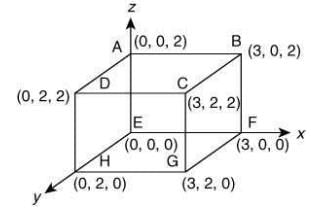
Ans: -48
Given that
Electric flux through closed area is given by
Electric flux through surface ABCD is
Electric flux through surface BCGF is
Here x = 3 so ϕII = 16 x 3 = 48 Nm2 /C
therefore,
ϕI - ϕII = 0 - 48 = -48Nm2/C
Q.63. For a uniformly charged ring of radius R, the electric field on its axis has the largest magnitude at a distance h from its center. Then value of h is [2019]
(a) R/√5
(b) R/√2
(c) R
(d) R√2
Ans: (b)
Let the total charge on the ring is Q then, electric field at the axis of a charged ring is given by
For maximum electric field,
Q.64. Three charges +Q, q, +Q are placed respectively, at distance, 0, d/2 and d from the origin, on the x-axis. If the net force experienced by +Q, placed at x = 0, is zero, then value of q is [2019]
(a) –Q/4
(b) +Q/2
(c) +Q/4
(d) –Q/2
Ans: (1)
Charge q is placed at center so, it is equilibrium condition for +Q placed at x = 0 For equilibrium,
Q.65. Two point-charges  and q2 (−25μC) are placed on the x-axis at x = 1 m and x = 4m, respectively. The electric field (in V/m) at a point y = 3 m on y-axis is
and q2 (−25μC) are placed on the x-axis at x = 1 m and x = 4m, respectively. The electric field (in V/m) at a point y = 3 m on y-axis is [2019]
[2019]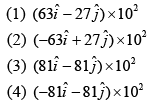
Ans: (1)
We know that electric field vector is
Let E1 and E2 are the electric field of q1 and q2.
For charge q1 = √10 μC
Therefore, total electric field vector is
Q.66. Charge is distributed within a sphere of radius R with a volume charge density  where A and a are constants. If Q is the total charge of this charge distribution, the radius R is [2019]
where A and a are constants. If Q is the total charge of this charge distribution, the radius R is [2019]



Ans: (2)
Let Q be charge is distribution within a sphere of radius R
Q.67. Two electric dipoles- A, B with respective dipole moments  are placed on the x-axis with a separation R, as shown in the figure.
are placed on the x-axis with a separation R, as shown in the figure. The distance from A at which both of them produce the same potential is [2019]
The distance from A at which both of them produce the same potential is [2019]

Ans: (4)
On the x axis in left on A potential due to A and B. But potential due to A is higher than that of B, between sign of potential due to A and B is opposite. So, potential can be same only in right of B on x-axis.
Therefore, distance
Q.68. Four equal point charges Q each are placed in the xy plane at (0, 2), (4, 2), (4, −2) and (0, −2). The work required to put a fifth charge Q at the origin of the coordinate system will be [2019]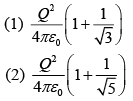

Ans: (2)
Potential at origin is
Now, work done, W = qΔV
Q.69. Charges –q and +q located at A and B, respectively, constitute an electric dipole. Distance AB = 2a, O is the mid-point of the dipole and OP is perpendicular to AB. A charge Q is placed at P where OP = y and y >> 2a. The charge Q experiences an electrostatic force F. If Q is now moved along the equatorial line to P′ such that OP' = (y/3), the force on Q will be close to  [2019]
[2019]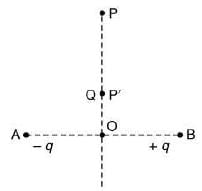
(a) 3F
(b) F/3
(c) 9F
(d) 27F
Ans: (d)
Electric field on equatorial plane of dipole is
Dividing Eq. (2) by Eq. (1), we get
⇒ F' = 27F
Q.70. Three charges Q, +q and +q are placed at the vertices of a right-angle isosceles triangle as shown below. The net electrostatic energy of the configuration is zero, if the value of Q is [2019]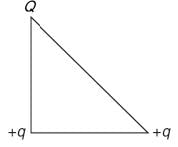
(a) -q/(1+√2)
(b) +q
(c) -2q
(d) -√2q/(√2+ 1)
Ans: (d)
Let a be the two equal sides of isosceles triangle.
Thus, net electrostatic energy is given as
Since, the net electrostatic energy is zero.
Therefore,
Q.71. Determine the electric dipole moment of the system of three charges, placed on the vertices of an equilateral triangle, as shown in the figure: [2019]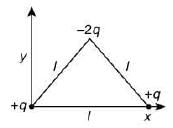
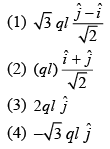
Ans: (4)
Dipole moment is P1 = ql cos θ
= ql cos 30° (1)
P2 = ql cos θ
= ql cos 30° (2)
Now, net dipole moment is
Since, direction of dipole moment is negative y axis.
Q.72. A parallel plate capacitor is made of two square plates of side ‘a’, separated by a distance d (d ≪ a). The lower triangular portion is filled with a dielectric of dielectric constant K, as shown in the figure. The value of capacitance of this arrangement is [2019]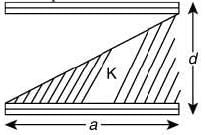
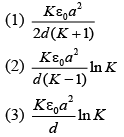

Ans: (2)
Consider a small element dx at a distance x.
Integrating both the sides, we get
Q.73. A parallel plate capacitor with square plates is filled with four dielectrics of dielectric constants K1, K2, K3, K4 arranged as shown in the figure. The effective dielectric constant K will be [2019]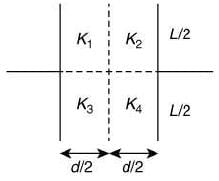
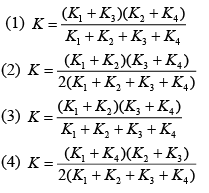
Ans: (N*)
Answer does not match with any given options
The arrangement of capacitor shown in the figure
This Answer does not match with any given options.
Q.74. A parallel plate capacitor is of area 6 cm2 and a separation 3 mm. The gap is filled with three dielectric materials of equal thickness (see figure) with dielectric constants K1 = 10, K2 = 12 and K3 = 14. The dielectric constant of a material which when fully inserted in above capacitor, gives same capacitance would be [2019] (a) 4
(a) 4
(b) 14
(c) 12
(d) 36
Ans: (c)
Let K be the dielectric constant of material
Q.75. A charge Q is distributed over three concentric spherical shells of radii a, b, c (a < b < c) such that their surface charge densities are equal to one another. The total potential at a point at distance r from their common centre, where r < a, would be [2019]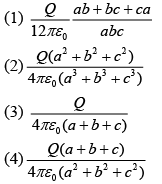
Ans: (4)
Let potential at distance r from then common center is
But surface change density for all are same.
Put these values in Eq. (1), we get
Q.76. A parallel-plate capacitor having capacitance 12 pF is charged by a battery to a potential difference of 10 V between its plates. The charging battery is now disconnected and a porcelain slab of dielectric constant 6.5 is slipped between the plates. The work done by the capacitor on the slab is [2019]
(a) 692 pJ
(b) 508 pJ
(c) 560 pJ
(d) 600 pJ
Ans: (b)
Initial energy of capacitor
Since battery is disconnected so charge remains same.
Final energy of capacitor is
Therefore, work done is
W = Ui – Uf
= 600 – 92 = 508 pJ
Q.77. The given graph shows variation (with distance r from centre) of [2019]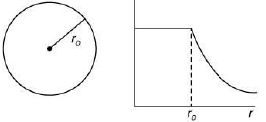
(a) electric field of a uniformly charged sphere.
(b) potential of a uniformly charged spherical shell.
(c) potential of a uniformly charged sphere.
(d) electric field of a uniformly charged spherical shell.
Ans: (b)
Growth and decay of current in LR circuit is
Therefore, the given charge shows the potential of a uniformly charged spherical shell.
Q.78. In the figure shown below, the charge on the left plate of the 10 μF capacitor is −30 μC. The charge on the right plate of the 6 μF capacitor is [2019]
(a) + 18 μC
(b) + 12 μC
(c) −18 μC
(d) −12 μC
Ans: (a)
6 μF and 4 μF are parallel to each other. Total charge is 30 μF.
Therefore, charge on right plate is +18 μC.
Q.79. An electric field of 1000 V/m is applied to an electric dipole at angle of 45°. The value of electric dipole moment is 10−29 C m. What is the potential energy of the electric dipole? [2019]
(a) −20 × 10−18 J
(b) −7 × 10−27 J
(c) −10 × 10−29 J
(d) −9 × 10−20 J
Ans: (b)
Potential energy is
Q.80. Seven capacitors, each of capacitance 2 μF, are to be connected in a configuration to obtain an effective capacitance of  . Which of the combinations, shown in figures below, will achieve the desired value? [2019]
. Which of the combinations, shown in figures below, will achieve the desired value? [2019]
(a)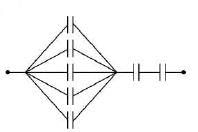
(b)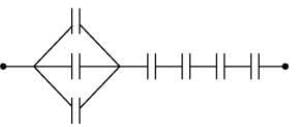
(c)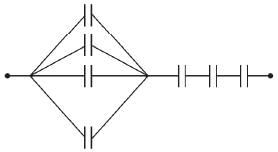
(d)
Ans: (b)
Effective capacitance is
Three capacitors are in parallel.
Q.81. There is a uniform, spherically symmetric surface charge density at a distance R0 from the origin. The charge distribution is initially at rest and starts expanding because of mutual repulsion. The figure that best represents the speed V(R(t)) of the distribution as a function of its instantaneous radius R(t) is [2019]
(a)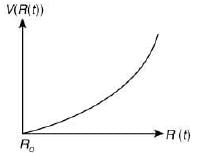
(b)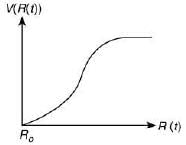
(c)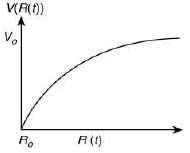
(d)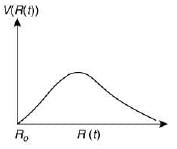
Ans: (c)
At any instant time t total energy of charge distribution is constant.
Also the slope of V-R curve will go on decreasing.
Q.82. In the circuit shown, find C if the effective capacitance of the whole circuit is to be 0.5 μF. All values in the circuit are in μF. [2019]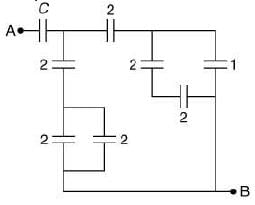

Ans: (1)
From given circuit
Q.83. A parallel-plate capacitor with plates of area 1 m2 each, are at a separation of 0.1 m. If the electric field between the plates is 100 N/C, the magnitude of charge on each plate is [2019]
(a) 7.85 × 10−10 C
(b) 6.85 × 10−10 C
(c) 8.85 × 10−10 C
(d) 9.85 × 10−10 C
Ans: (c)
By Gauss law electric field is
FAQs on JEE Main Previous Year Questions (2016-2025): Electrostatics- 1
| 1. What is electrostatics? |  |
| 2. What is the difference between electric potential and electric field? |  |
| 3. How does the electric field due to a charged particle vary with distance? |  |
| 4. What is the concept of electric potential energy? |  |
| 5. How can we calculate the electric field due to a system of charges? |  |

